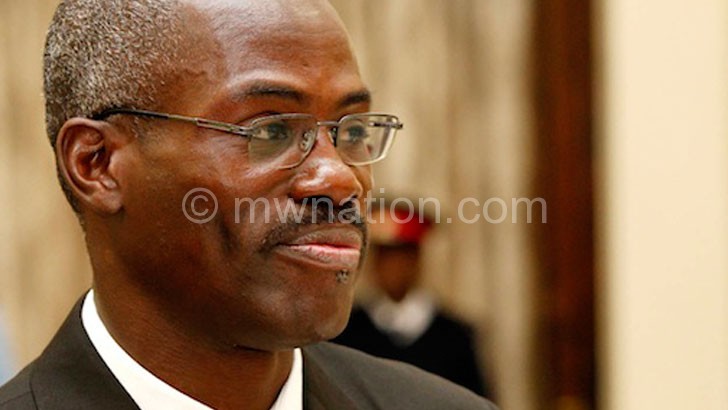Solomonic wisdom
The first time I saw Justice Lovemore Chikopa, I was mesmerised by his audacious football tricks, including a brilliantly executed overheard kick that could’ve turned Cristiano Ronaldo green with envy.
He was already a High Court judge then. And the oldest on the pitch by far, but had just out-thought—and out-jumped—anyone on the pitch to score his brilliant goal. Were this not a social football match, Chikopa could’ve been an Internet sensation.

This week, Justice Chikopa, rose to the occasion again. But this time around, he impressed many not on a dry football pitch, but in his line of duty.
Delivering a Supreme Court ruling on an application by the Attorney General, who was seeking an order to ban the ongoing spate of deadly street protests, Chikopa JA, as folks in the judiciary would call him, found some Solomonic wisdom.
“Having looked at the rights in issue and considered the constitutional landscape operating in this jurisdiction since 1994, the decision of the court below and while we agree that the demonstrations should not be by unilateral executive order and also that to demonstrate one only needs to notify and not ask for permission,” declared Chikopa. And he continued: “We are of the most considered view that the right to peacefully demonstrate and assemble unarmed can be limited.”
Then he issued a 14-day moratorium in which the protest leaders and the AG should find the ‘golden means’ of peaceful demonstrations.
Friends at the bar tell me that Chikopa is a slave to the pronoun “we”, in his rulings. But the wisdom encapsulated in this particular ruling means that we, too, can own whatever he stated.
For some time, we, too, have urged all parties involved in the political saga to exercise restraint. We’ve endlessly called for the political leadership, especially the President, for the sake of the nation, to reach out to his rivals.
That we have urged with understanding and clarity that the court case should go on unimpeded and with haste. And that those protesting the election results, too, should be let be and protest under State protection, without infringing upon rights of others by damaging property.
The only argument we’ve rejected, is the argument that demonstrations are bad because they hurt the economy. Well, our economy, and development in general, we’ve always reckoned, has been mutilated by bad governance more severely than the protests.
But we’ve been on the streets, too, and witnessed with our naked eyes the looting; and heard the sad testimonies of those whose businesses and life-savings have vanished into the thin air through the looting. We can’t ignore them either!
Yet, we entirely agree with Chikopa that no person or office in this country can curtail the rights enshrined in our Constitution, but that doesn’t mean we should be in a state of flux because our reasoning has always been as a nation—25 years after returning to democracy—like a full adult, we can do both at once. We can walk and chew at the same time.
So, what Chikopa has called for, hence, is reasonable. Indeed, both sides should first engage in dialogue about how we should limit the damage to the economy and lives of innocent people. For that to take place, Chikopa, in his Solomonic wisdom, urged all parties to avoid inflammatory statements.
President Mutharika, in particular, has acted irresponsibly in our estimation since the long winter of discontent started. Whether out of natural belligerence or some perceived survival strategy, Mutharika threatened those rejecting his re-election, instead of reaching out with a carrot.
“The Attorney General,” wrote Chikopa, “should specially heed the foregoing and advise those in relation to whom he is legal adviser to proceed with caution.”
Mutharika, speaking in front of military gunships, just days before the suspended demonstrations, ordered the military to use all force necessary to end the demonstrations and on eve of the protests, Information Minister Mark Botomani released a statement, late at night, buttressing the same threat of violence for those who were to defy the State’s wish against the protests.
So, you don’t have to be King Solomon, too, to decipher, whom Chikopa was asking to shut up and let dialogue take course. But you would be mightily mistaken to think that this writer believes the civil society, or its backers in the opposition have covered themselves in glory only.
While, the Human Rights Defenders Coalition (HRDC) can pat itself on the back for awakening the sleeping lion that is spirit of protest among Malawians, normally considered too meek, and while the mere fact that the constitutional court’s existence suggests that their tactics are justified as past electoral challenges quickly fizzled out, the protest leaders have to look at dialogue as an opportunity.
What is their end game? And once Jane Ansah resigns, what tangible reforms with long-term impact on our democracy would they want enacted. Apart from seeking electoral justice, dialogue affords HRDC to impact more on our society and build on the incredible work they’ve achieved. And as illustrated at length in a previous article, HRDC, too, needs to understand that it can’t only use one method to seek progress.





